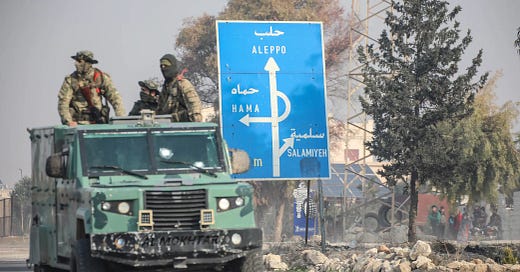‘Gradually, then suddenly’: Syria rebels advance on strategic city of Homs, Assad forces fall back
Events in the Levant this week brought to mind the Ernest Hemingway quote, from The Sun Also Rises: “‘How did you go bankrupt?’ ‘Two ways. Gradually, then suddenly.’”
After capturing Syria’s second largest city Aleppo last week, Turkish-backed Syrian rebels moved south, capturing Hama on Thursday, as Syrian government forces loyal to dictator Bashar al-Assad withdrew. The Syrian rebel group, Hayat Tahrir al-Sham (HTS), announced on Friday (Dec. 6) that they had taken the last village before the strategically located city of Homs, at a highway juncture which connects the Syrian capital Damascus to the coastal city of Tartus, where Russia has a naval base.
“For Assad and his supporters, losing Aleppo was catastrophic, and losing Hama made things significantly worse,” Syria expert Aron Lund said in a Q & A published by the Century Foundation today (Dec. 6). “But if the government were also to lose Homs, then that’s something else. In that case, I think we’re looking at something resembling a death spiral.”
“HTS’ Administration of Military Operations announces they’ve taken the last village before Homs City,” Aaron Zelin, an expert on jihadi groups, translated an announcement of the group on Twitter Friday. “The battle for the city is about to happen.”
Pro-Syrian government media Samaa TV reported that Assad had arrived in Tehran Friday for consultations to discuss military developments, according to a reporter with BBC Persian. However, some other reports contradicted that Assad had left the capital. Iran International reported Saturday that Ali Larijani, an advisor to Iran’s Supreme Leader Ali Khamenei, had supposedly met Assad in the Syrian capital Damascus on Friday.
Amid the fast moving developments, the foreign ministers of Iran, Turkey and Russia were due to meet in Doha, Qatar on Saturday. But Iranian expectations were low.
“Informed sources in Tehran told Amwaj.media that there are no expectations that the trilateral meeting in Doha will produce a breakthrough, particularly in favor of Assad,” Amwaj.media reported.
Meantime, several of Syria’s neighbors, including Lebanon, Jordan and Iraq, announced restrictions on border crossings from their respective countries into Syria.
Jordanian Interior Minister Mazen al-Faraya said on Friday that Jordan had decided to close the Jaber border crossing “because of the security situation in southern Syria,” the Jordanian government said.
Iraq’s premier, meantime, said Iraq did not want to get dragged into a war in Syria.
“We will not remain passive observers of what is happening in Syria, but at the same time, we do not want to drag Iraq into a war that could dismantle all the privileges of the political process,” Iraqi Prime Minister Mohammed Shia’ Al-Sudani said on Thursday.
Iraqi politician Muqtada al-Sadr also urged the Iraqi government to refrain from intervening in Syria, Iraqi journalist Mustafa Saadoon, with the Iraqi Observatory for Human Rights, noted.
“We like the people of Syria, and also we hope we can support them to reach a new formula,” for power sharing and eventual democratic elections, Iraqi Sunni politician Mohammed Rikan Hadid Al-Halbousi, who served as the speaker of the Iraqi Council of Representatives from 2018 until 2023, told journalists on a visit to Washington Friday.
US officials urged the protection of human rights and minorities, and privately expressed wariness about developments in Syria.
“We are closing monitoring the situation on the ground,” a State Department official, speaking not for attribution, said Friday.
“The United States, together with its partners and allies, urges protection of civilians, including members of minority groups. The time is now for negotiating an end to the Syrian conflict…Constant refusal by the Assad regime to engage in this process led directly to the events we are now witnessing.”
“We call on all actors to respect human rights, take all precautions to protect civilians, and to uphold international humanitarian law.”
Privately, American officials have acknowledged that Washington is deeply wary of both sides in the latest episode of Syria’s now unfrozen civil war, given HTS’ jihadi roots.
The United States designated HTS, which in an earlier iteration had links to al Qaeda, a terrorist group in 2018. But HTS has made a concerted effort in its latest campaign to show tolerance towards Syria’s non-Sunni ethnic and religious minorities, and has issued several statements meant to be reassuring.
“No one has the right to erase another group,” HTS leader Abu Mohammad al-Jolani told CNN’s Jomana Karadsheh in an exclusive interview in Aleppo on Thursday. “These sects have coexisted in this region for hundreds of years, and no one has the right to eliminate them.”
“Syria deserves a governing system that is institutional, not one where a single ruler makes arbitrary decisions,” Jolani told CNN.
He said his group aims to overthrow the Assad regime, but he does not envision that HTS should rule Syria alone.
“We are talking about building Syria,” Jolani told CNN. “Hayat Tahrir al-Sham is merely one part of this dialogue, and it may dissolve at any time. It is not an end in itself, but a means to perform a task: confronting this regime.”
Jolani also sent messages to Lebanon, Russia and Iraq, urging them not to intervene on Assad’s behalf.
“We have no intention of expanding into Iraq, and we urge Iraq to refrain from supporting Bashar al-Assad’s regime,” Jolani said in a recorded video message addressed to the Iraqi government on Friday.
Photo: by Izettin Kadim, Anadolu, via Getty Images.
**



